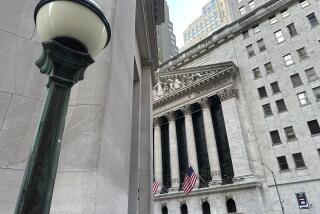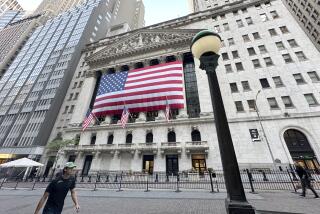Broad Selling Wave Hits Stock Market; Dow Declines 26.02
NEW YORK â The stock market contracted another case of the Monday blues, declining broadly in selling attributed to rising interest rates and activity by professional program traders.
The Dow Jones average of 30 industrials, which was up 43.87 points last week, fell 26.02 to 1,811.02.
Volume on the New York Stock Exchange was a sluggish 109.01 million shares, down from 124.11 million on Friday.
Interest rates rose in the credit markets, pushing prices of long-term government bonds down about $5 for every $1,000 in face value.
Analysts said upward pressure on interest rates helped prompt weakness in stock index futures, and that, in turn, led professional traders to buy the futures and sell individual stocks.
Other than those primarily technical forces, brokers said, there was nothing in the economic news to account for the marketâs retreat.
The Commerce Department plans to issue figures Wednesday on economic growth for the third quarter of the year.
The data is expected to be notably better than the sluggish growth of 0.6%, at an inflation-adjusted annual rate, reported for the second quarter. But analysts said the report is unlikely to clear up confusion and uncertainty among investors about prospects for business through the remainder of this year and into 1987.
Suffered Early Losses
Just about all of Mondayâs losses were recorded in the early moments of trading. After that, brokers said, the market suffered more from neglect than any urgent rush to sell.
Losers among the blue chips included International Business Machines, down 1 5/8 at 120; General Electric, down 1/2 at 76; Sears, Roebuck, down 1 at 41 7/8, and American Telephone & Telegraph, down at 23 3/4.
Goodyear Tire, which climbed last week on takeover speculation, fell back 1 1/8 to 40 3/8 in active trading.
Bank stocks were mostly lower in the face of the increase in open-market interest rates. Manufacturers Hanover dropped 1 to 42 3/4, Chase Manhattan fell 1/2 to 35 1/8, J. P. Morgan fell 7/8 to 82 5/8, Chemical New York fell 1 to 43 and Citicorp fell 1/8 at 47 7/8.
On the plus side, Zayre rose 1 1/2 to 22 3/4. The company reported plans to buy back as many as 3 million of its common shares.
USX gained 1 to 27 as investors speculated on what moves the company might make to counter a takeover bid by financier Carl C. Icahn.
In the overall tally on the Big Board, declining issues outnumbered advances by nearly three to one, with 1,112 down, 408 up and 405 unchanged. Nationwide turnover in NYSE-listed issues, including trades in those stocks on regional exchanges and in the over-the-counter market, totaled 132.84 million shares. A total of 1,915 blocks of 10,000 or more shares traded on the NYSE, compared to 2,361 on Friday.
Standard & Poorâs index of 400 industrials fell 3.13 to 261.83, and S&P;âs 500-stock composite index was down 2.87 at 235.97.
Bond prices fell and short-term interest rates rose in light trading.
Traders feared that prices for existing issues would weaken amid the large quantity of U.S. Treasury securities expected to flood the market over the next three weeks, analysts said.
In addition, they were concerned about the uncertainty surrounding the meeting of the Organization of Petroleum Exporting Countries in Geneva, analysts said. The cartel has been struggling for two weeks to reach an agreement to limit oil production in order to raise prices.
The Treasury Department sold $7.5 billion in three-month bills on Monday at an average discount rate of 5.30%, up from 5.13% last week.
Another $7.5 billion was sold in six-month bills at an average discount rate of 5.39%, up from 5.22% last week.
The Treasury also has scheduled the sale of $20 billion in one- and two-year notes.
Concern Over Treasury Sales
A sale of another $7 billion in seven-year notes also may be announced for this week, and then, later this month, the Treasury is expected to announce the sale of 3-, 10- and 30-year securities for its November refunding. The quarterly refunding is expected to total about $28 billion, the same as the previous auction, traders say.
âThereâs concern about dealersâ being able to market them easily,â said Ron Talley, an economist at Pittsburghâs Mellon Bank.
The yield on 30-year Treasury bonds rose to 7.91% from 7.84% late Friday, while the price dropped by about $7.50 for each $1,000 of face amount.
In the secondary market for government bonds, prices of short-term governments fell 5/32 point, intermediate maturities fell 3/8 point and long-term issues were down 5/8 point, according to the investment firm of Salomon Bros. The movement of a point is equivalent to a change of $10 in the price of a bond with a $1,000 face value.
The Merrill Lynch daily Treasury index, which measures price movements on all outstanding Treasury issues with maturities of a year or longer, fell 0.43 to 116.27.
The Shearson Lehman daily Treasury bond index, which makes a similar measurement, fell 4.25 to 1,216.58.
In corporate trading, industrials and utilities fell 3/8 in light trading.
Among tax-exempt municipal bonds, general obligations fell point and revenue bonds were unchanged. Trading was light.
Yields on three-month Treasury bills were up 3 basis points to 5.30%. Six-month bills rose 5 basis points to 5.42%, and one-year bills were up 6 basis points at 5.54%. A basis point is one-hundredth of a percentage point. The federal funds rate, the interest on overnight loans between banks, traded at 5.8125%, down from 5.875% late Friday.
More to Read
Inside the business of entertainment
The Wide Shot brings you news, analysis and insights on everything from streaming wars to production â and what it all means for the future.
You may occasionally receive promotional content from the Los Angeles Times.










